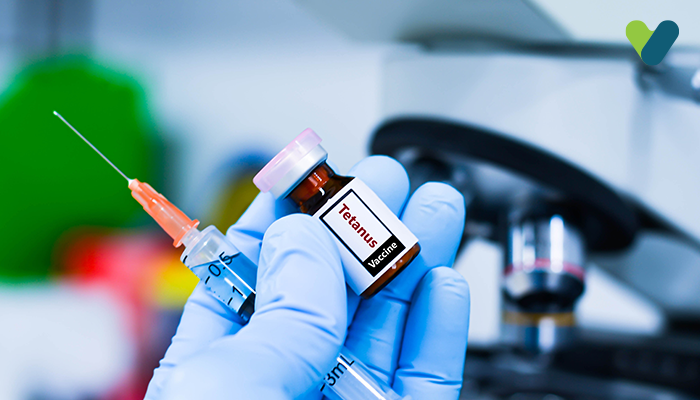Justin was playing passing the ball in the playground with his friends. Suddenly, one of his friends, Akash, stepped on the rusted iron nail in the playground. Everyone started panicking because the home was far away from the ground. Justin then remembered how her mother used to tell him that if anyone gets hurt by iron and blood starts coming out, he/she must get the tetanus vaccine first to protect against the bacterial infection tetanus, when Justin and his friends went to the doctor. The doctor also added that there are some mild tetanus vaccine side effects like fever, redness, and swelling near the area where the injection was given.
What Is the Tetanus Vaccine?
The tetanus vaccine is included in the recommended children and adult vaccination schedule. It fights against tetanus, often known as lockjaw, a bacterial illness. The tetanus vaccination may also comprise components that help you from catching other dangerous bacterial infections like diphtheria and pertussis (whooping cough).Causes
- Clostridium tetani bacteria cause tetanus. The bacteria's spores can be found in dust, soil, and animal waste. Spores are microscopic reproductive bodies that some species create.
- They're frequently resistant to extreme weather conditions, such as extreme heat. When these spores reach the bloodstream through a cut or severe incision, a person might get sick.
- This toxin is a substance that stops nerve impulses from the spinal cord from reaching your muscles. As a result, severe muscle spasms might occur.
Common factors
The following factors raise the risk of tetanus infection:- Cuts or sores that have been exposed to dirt or faeces
- A foreign body, such as a nail or a splinter, is lodged in a wound.
- Immune-suppressing medical disorders in the past
- People with diabetes have infected skin sores.
- When a woman isn't properly immunized, the umbilical cord becomes infected.
- Needles for illicit drug users that are shared and unclean
Complications
Complications associated with tetanus shot side effects may include:- Pneumonia, a consequence of widespread spasms, might be aspiration pneumonia caused by accidentally breathing anything into the lungs.
- Breathing difficulties. Tightening of the vocal cords and muscular stiffness in the neck and abdomen, primarily during a widespread spasm, can cause life-threatening difficulty breathing.
- A clogged artery in the lungs (pulmonary embolism). A blood clot from another part of your body might obstruct the main artery or one of its branches in the lung.
- Bones have been broken. Generalized spasms can result in spine or other bone fractures.
- Death, tetanus is generally fatal due to a constricted airway caused by spasms or nerve damage that controls breathing, heart rate, and other organ functions.
Common side effects
There are some mild tetanus shot side effects. All varieties of tetanus injections have the same side effects. The majority of these side effects reflect your body's attempt to build immunity against the illness.- At the injection site, you may experience pain, redness, or edoema.
- Fever
- Other aches and pains in the body, such as a headache
- Lack of energy
- Stomach bug
The Tdap vaccination causes nausea, vomiting, and diarrhea, considered a minor adverse effect. According to the CDC, one out of every ten adults is affected. If this happens to you, be sure to get enough rest, drink lots of water, and stay away from items that can disturb your stomach even more.
- A severe allergic response
Tetanus Vaccine Types and Schedules
The injection usually affects children's arms or thighs. Four distinct vaccinations protect tetanus and other infections. Your age and vaccination status determine your choice.- Tdap is administered to adults and older children. Diphtheria, tetanus, and pertussis are all prevented by this vaccine.
- The whooping cough vaccination has caused a terrible response in newborns and young children. DT is used to treat them. Only diphtheria and tetanus are protected.
- Td is a booster injection that exclusively protects against diphtheria and tetanus in older children and adults.
- Babies and young children are administered DTaP. Diphtheria, tetanus, and pertussis are all prevented by this vaccine (whooping cough).
Who Should Not Get the Tetanus Vaccine?
- If you've had a severe adverse response to a previous Tdap vaccination, you shouldn't get one.
- You must not have a Tdap vaccine if you've had a previous Tdap immunization and had a coma or seizures within a week.
- Before getting the vaccination, talk to your doctor if you have a history of epilepsy or other nervous system disorders, significant pain or swelling after a prior tetanus immunization, or a history of Guillain-Barre syndrome or chronic inflammatory demyelinating polyneuropathy.
- For tt injection during pregnancy side effects, see a doctor.


